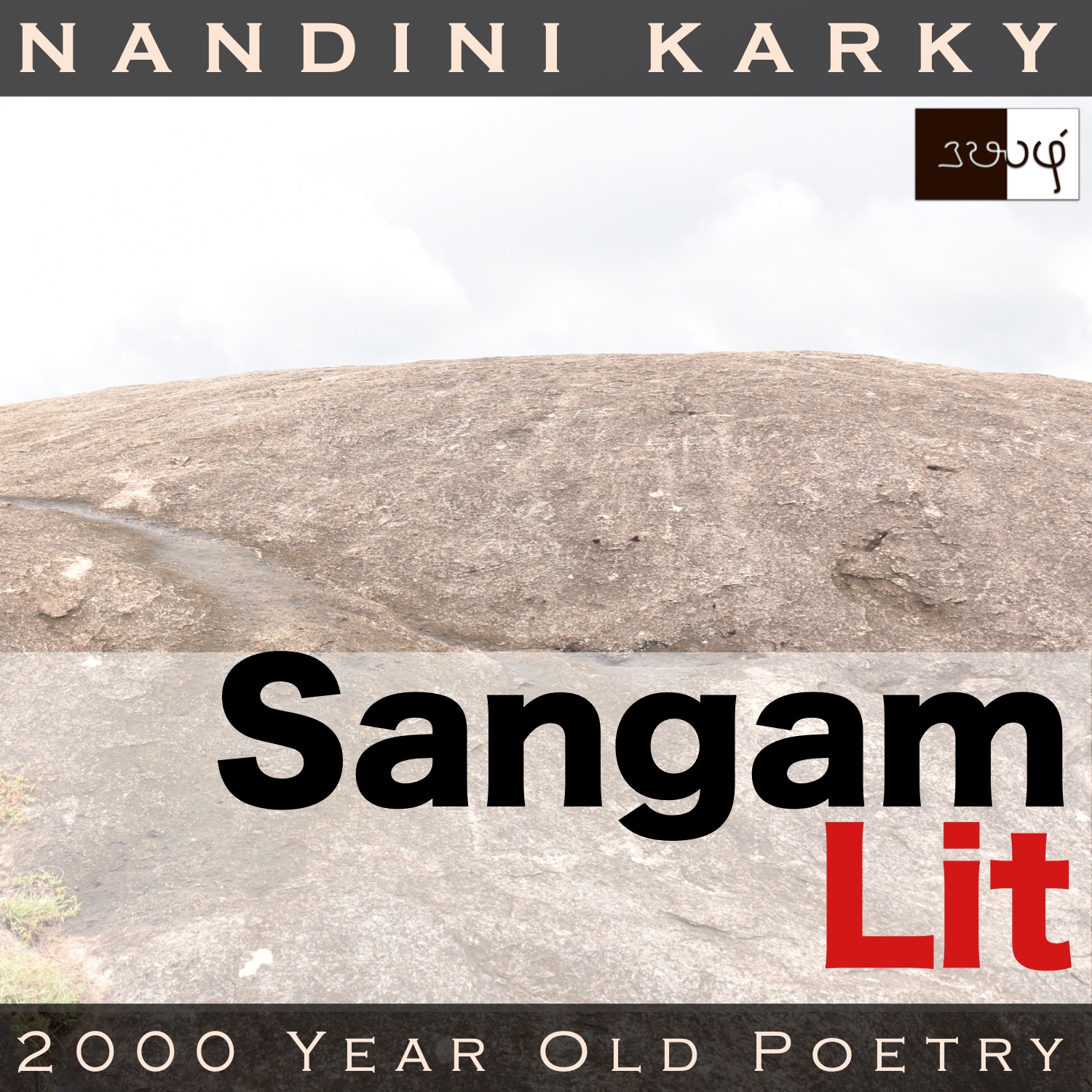Podcast: Play in new window | Download
Subscribe: Apple Podcasts | Spotify | Amazon Music | Android | iHeartRadio | TuneIn | RSS | More

In this episode, we get a glimpse of the dangers in ancient travel, as depicted in Sangam Literary work, Kurunthogai 12, penned by Othalaanthaiyaar. Set in the drylands of ‘Paalai’, the verse speaks in the voice of the lady, perceiving the worry in her confidante about her state, after the man had parted away.
எறும்பி அளையின் குறும் பல் சுனைய
உலைக்கல் அன்ன பாறை ஏறி,
கொடு வில் எயினர், பகழி மாய்க்கும்
கவலைத்து என்ப, அவர் தேர் சென்ற ஆறே;
அது மற்று அவலம் கொள்ளாது,
நொதுமல் கழறும், இவ் அழுங்கல் ஊரே.
A rousing tune of peril echoes throughout the verse. First, we encounter ‘எறும்பி அளையின்’ meaning ‘anthill holes’. Let’s pause a moment to relish how ‘எறும்பு’, the contemporary word for ‘ant’, sounds so much more adorable in its Sangam version as ‘எறும்பி’. Sounds almost like a nickname! Moving on, there’s reference to ‘a smith’s forge’ in ‘உலைக்கல்’ and perceive an ancient occupation and its associated artefact. As we journey on, we get to meet ‘கொடு வில் எயினர்’ meaning ‘drylands tribe with fierce bows’. Note how the fierce nature of these men have been transferred to the bows they hold! Thereafter, an intriguing word ‘நொதுமல்’ appears and I learnt that it has a rich meaning of ‘words by someone indifferent to another’s distress’. Ending with ‘இவ் அழுங்கல் ஊரே’ meaning ‘this boisterous town’, the verse invites us to investigate further.
One can visualise the lady with a straight lip, shaking her head in disbelief. The context will reveal her inner story. The man and lady had been leading a love relationship when the man parted away to gather wealth for their wedding. At this time, the confidante starts to worry that the lady will not be able to bear this separation and through the changes in her, will invite gossip from the town. Understanding her friend’s thoughts, when the confidante is in earshot, the lady says, “Alongside tiny springs with mouths, akin to anthill holes, lie rocks, hot like a blacksmith’s forge. Climbing on such a rock, stand men of the ‘eyinar’ tribe with fierce bows, sharpening their arrows. Such is the path that the man has chosen to traverse, say those who know. Not worrying about that, this uproarious town seems intent on hurting me with heartless words.” With these words, the lady relays the exact core of her worry and chides the town that gossips about her and indirectly, her friend too, for focussing on the inessential.
What exactly is shaking up the lady so much? Let’s follow her as she takes us on the path the man has gone on. She points to tiny holes in the ground, which look like the mouths of ant hills, and explains that those are the only freshwater springs in that region. There will hardly be any water to quench a traveller’s thirst, we understand. Then, the lady points to a boulder lying nearby and tells us how hot these are, by equating them to a blacksmith’s red-hot forge. The lady has mentioned the rocks only to talk about how men from the ‘eyinar’ tribe climb on these rocks. When she equated the boulder to a blacksmith’s forge, we understood how deadly hot the land was but now, we perceive the true danger in seeing the fierceness of these men, who seem not to mind even those hot rocks. When we peer to see why they have climbed up, we observe their sturdy bows and see them sharpening their arrows on those forge-like rocks. The lady concludes this description saying people who have walked that way have told her that’s how the man’s path would be!
As the lady finishes, although we are strangers living in the comfort of this twenty-first century world, even we can acutely feel thirst tightening the throat, heat ravaging the feet and anxiety about the robbers’ arrows assailing anyone on that path! But, the scene is different in my surroundings, the lady tells us and explains how the town around seemed not to have a shred of care about these dangers and seemed intent only on gossiping and talking irrelevant, apathetic words to her. Through these words, the lady also chides her friend for worrying about the lady’s health and how she should put up a face before everyone else, instead of understanding the real danger in the man’s path that was worrying the lady. The verse seems to whisper that rather than focusing on mere outer appearances, it’s only when a person perceives the true core of another’s worry, they will be able to offer a meaningful consolation. Indeed, a masterclass in the art of empathy!




Share your thoughts...